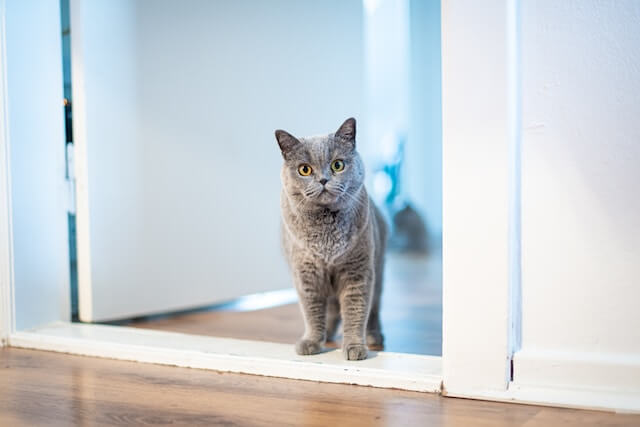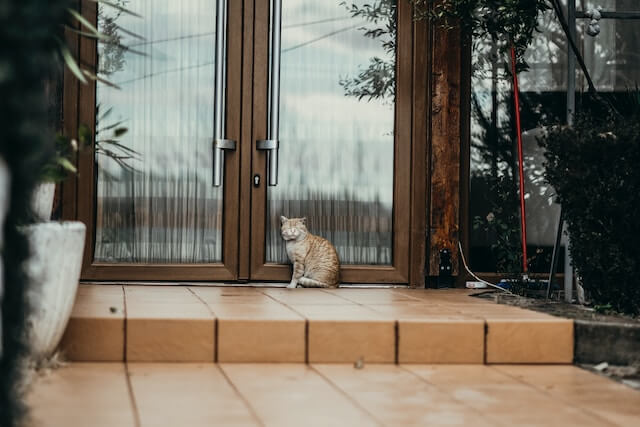In how cats behave, something has confused cat owners for a long time – the strange dislike cats have for closed doors. Whether it’s the bedroom, bathroom, or even the closest, our curious pets simply can’t resist showing their unhappiness when they come across a closed door. So, Why Do Cats Hate Closed Doors?
Cats are famously curious. They like to chase red dots and explore everything around them. A closed door gets in the way of their desire to explore and find out new things. There could be many secrets or new challenges waiting behind closed doors. So, when a door is closed, and they can’t go through it, it makes them curious and frustrated. They might even complain out loud.
Let’s explore cats’ exciting and unique world to discover Why Do Cats Hate Closed Doors.
Why Do Cats Not Like Closed Doors?
There are many reasons. Why Do Cats Hate Closed Doors?
- The fear of missing out (FOMO)
- Territory and control
- Training and Reinforcement
- Communication and Expression
And those reasons can be different each day. Cats are small creatures with complex behaviors. Sometimes, we don’t have the exact reasons for doing something repeatedly, so we should refrain from assuming that our cats do.
1. The Fear of Missing Out (FOMO)
Cats like being around people, even though they may not show it like dogs do. They appreciate having humans around them. When dogs can’t be with their favorite people at a closed door, they get sad and worried.
They don’t want to miss any chance to spend time together or form a connection. This is Why Do Cats Hate Closed Doors, and it can make them scratch or meow at the door all the time, hoping to be back with their beloved person.
2. Territory and Control
Cats like to have their own space and be in charge of their surroundings. They are territorial creatures. A closed door can be seen as a test of their territory Why Do Cats Hate Closed Doors?
They are naturally intrigued to explore what is beyond and ensure that no land remains unclaimed. They want control, so they try to open a closed door or speak out against the rules that limit their area.
3. The Search for Privacy
Cats like having space and time alone, like how they enjoy getting attention. Sometimes, cats like having their little hiding place, which can be seen as closed doors. If you don’t let them hide where they want, they might get upset and ask you to let them in.
4. Training and Reinforcement
Sometimes, cats realize they can get attention from their humans by doing a specific behavior. If a cat has mewed and scratched a closed door before and it was opened, they might think that doing those things will get them what they want. Therefore, they are more likely to do the same thing again when they encounter a closed door.
Lastly, it’s important to remember that cats talk to us differently. When cats meow or scratch at closed doors, they show their feelings and wants. This is how they tell us what they want to come inside, to look around, or just to be with us.
You will also like:
- Why are Car Dealerships Closed on Sundays?
- Why Are Chinese Restaurants Closed on Tuesdays
- Why Are Chinese Restaurants Closed On Mondays
Why It’s A Good Idea To Leave Your Doors Open For Your Cat?

Allowing your cat to come in and out of your house freely can be a great idea with many advantages for you and your cat. Cats like to explore, and open doors allow them to satisfy their curiosity. When we permit them to enter different rooms, they can enjoy the thrill of finding new places and smells, which keep their minds active and interested. In addition, holding doors open can make cats feel less stressed and anxious. It makes them feel included and part of the family’s activities. This also helps you and your cat become closer and have stronger feelings.
Open doors help control the temperature so your cat can find cozy places to relax in different weather. Letting animals stay in their designated area and move around without restrictions, you help them feel in charge and like they own their home. With an open door policy, your cat can come and go as they please, enjoying their freedom while still being loved as a family member.
Also, having open doors in the environment helps your cat to be more active and move around more. They can explore, extend, extend their bodies, and have fun, which allows them stay healthy and avoid possible health problems. Taking away the confusion of closed doors also eliminates any potentially harmful actions that may happen when a cat is curious about what is behind them.
Finally, it is a nice thing to leave your doors open for your cat. It makes their life better and keeps them healthy. It helps your cat feel happy and satisfied and strengthens the connection between you and your furry friend. Giving your pets freedom and allowing them to come and go as they please in your home helps them feel happy and content. It also lets them explore their surroundings and make your home a peaceful and enjoyable place for everyone.
How To Fix The Meowing Problem Of Cats At Closed Doors

Is your cat’s constant meowing at closed doors becoming a source of frustration for you? You can take several steps to address and resolve this behavior.
Remember, you must be patient and consistent when dealing with your cat’s meowing at closed doors. Be careful and patient when introducing new things to your cat, and give them enough time to get used to the changes. Using the correct methods and knowledge, you can assist your cat in stopping this behavior and make a peaceful home for both of you.
Let’s explore practical strategies to help fix your problems of meowing behind closed doors!
1. Identify the Underlying Reasons
As discussed above, various reasons can trigger a cat’s meowing at closed doors. Before implementing any changes, identify the cause of your cat’s behavior. Is it due to curiosity, separation anxiety, a need for attention, or a territorial issue? Understanding the root cause will guide you in finding a suitable solution.
2. Gradual Exposure and Positive Reinforcement
If your cat is meowing due to curiosity or feeling left out, try gradually exposing them to the closed-door scenario. Open and close the door before them, allowing them to see what’s behind it. Offer treats, toys, or affection as positive reinforcement to create a positive association with the closed door rather than an obstacle.
3. Create Alternative Entertainment
To keep your cat engaged and distracted, provide alternative sources of entertainment. Interactive toys, puzzle feeders, or a window perch with a view can keep them occupied and reduce their fixation on closed doors.
4. Address Separation Anxiety
If your cat’s meowing is driven by Separation anxiety, work on building their confidence and independence. Gradually lengthening them. Leave toys or comforting items with your scent to provide reassurance while away.
5. Enrich Their Environment
Ensure your cat’s environment is stimulating and enriching. Add scratching posts, climbing trees, and cozy hiding spots to create a cat-friendly space. This way, they will feel free to seek out closed doors for entertainment or security.
6. Ignore the Meowing
Avoid rewarding the behavior with immediate responses if your cat meows for attention. Instead, wait a quiet moment before entering the room or providing attention. Be cautious with this approach; some cats might escalate their meowing if ignored. Always ensure their essential needs, like food, water, and litter, are met promptly.
7. White Noise or Music
Using white noise machines or playing calming music can help drown out external sounds that might trigger your cat’s meowing at closed doors. It can create a more peaceful environment, reducing their stress levels.
8. Consult with a Veterinarian or Animal Behaviorist
If the Meowing persists despite trying these strategies, consulting with a veterinarian or an animal behaviorist is a good idea. They can thoroughly assess your cat’s behavior and health to determine any underlying medical issues or specialized behavior modification techniques that could be beneficial.
Patience and consistency are key when Addressing your cat’s meowing at closed doors. Be gentle with your approach and allow time for your cat to adapt to the changes. With the right strategies and understanding, you can help your feline friend overcome this behavior and create a harmonious living environment for both of you.
Why Do Cats Hate Closed Doors: Final Result
In conclusion, cats don’t like closed doors because they are curious, social, territorial, and like certain temperatures. By understanding Why Do Cats Hate Closed Doors, we can improve our parenting skills and have a closer connection with these fascinating animals.
So, the next time your cat is unhappy about a door being closed, think about things from their perspective. If you open the door, you can make them love you.



